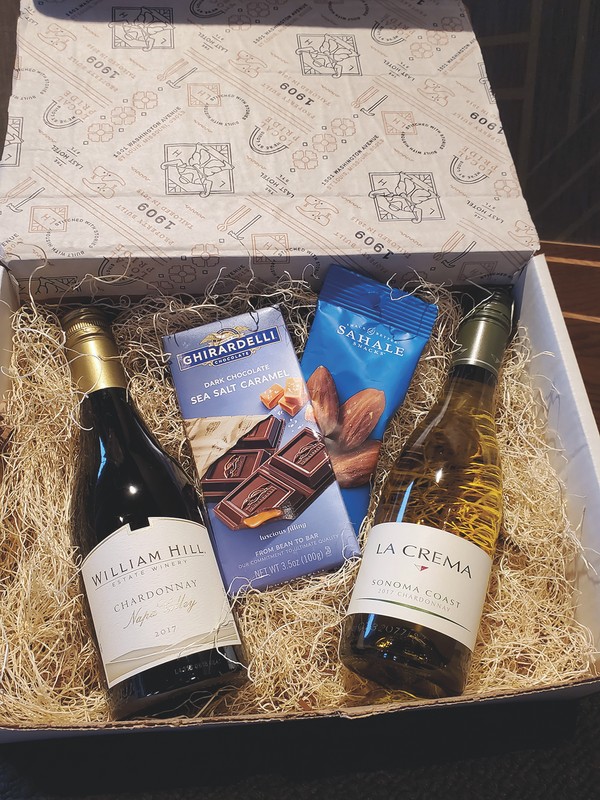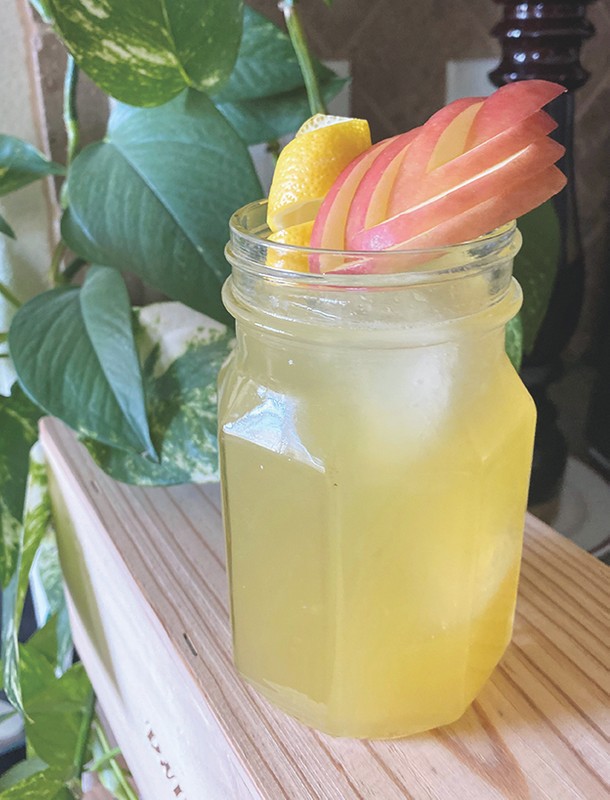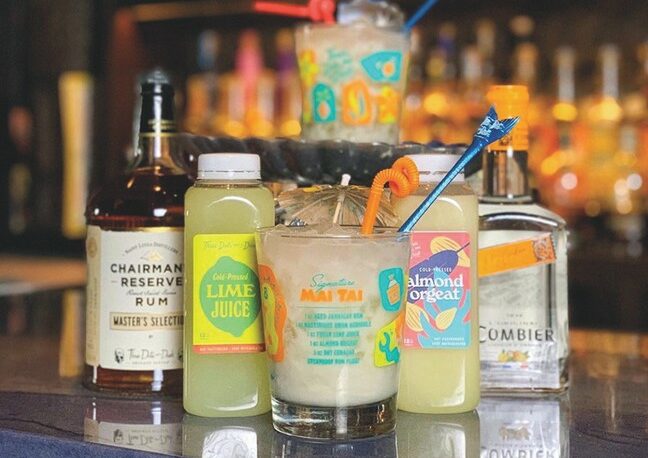
When Covid-19 hit the restaurant and bar sector last spring, thousands of venues across the country were forced to close immediately and without warning. It was a devastating blow that will have lasting impacts. As restrictions loosened in some markets, on-premise outlets began reopening in various forms, creating takeout and to-go models as well as forming new outdoor dining and drinking spaces. In the hardest-hit cities, where extended closures went on for months, restaurateurs and bar operators had to get creative to find new revenue streams and extend their brands beyond the four walls of their brick-and-mortar spaces. Fostering at-home drinks experiences played heavily into this effort, boosting spirits and allowing for a new type of creative mixology.
“Covid has impacted every aspect of our business,” says Death & Co. founder and co-owner David Kaplan. “During the full shutdowns last spring we worked to find new ways to connect with our guests via social media and our online marketplace. As the pandemic rages on, we continue to adapt our operations. We started selling experiences on our site during the first shutdown and have continued to expand them and add items that will appeal to the at-home cocktail enthusiast. We’ve started to offer more at-home bar essentials on our marketplace and recently added online classes.”

Death & Co. embraced several opportunities to bring its brand and bar experience into peoples’ homes during 2020. Along with offering a variety of pre-mixed to-go cocktails and packaged foods at its three locations in New York City, Denver, and Los Angeles, the company added innovative offerings to its online market, like a two-hour private cocktail class for up to six people ($800), a custom curated at-home bar cart by original Death & Co. bartender-turned-partner Alex Day ($5,000), and the Death & Co. At Home experience, which includes an evening of custom cocktails and paired cuisine at the buyer’s home—anywhere in the U.S.—executed by the company’s team of talent ($10,000). By the end of 2020 the company had sold nearly 20 private cocktail class packages and one each of the custom bar cart and the Death & Co. At Home experiences.
These joined in-person encounters like a five-pack of priority reservations at the bars ($200), a signature Death & Co. cocktail named after and designed for the buyer ($2,500), and an all-inclusive getaway to The Ramble Hotel in Denver ($6,500). For the winter holiday season, Death & Co. added themed drinks to its takeout menu, including the Vintage Eggnog, mixing Old Grand-Dad 114-Proof Bourbon, Smith & Cross Jamaican rum, Pierre Ferrand Ambre Cognac, Henriques & Henriques 5-year-old Generoso Doce Madeira, egg, and cream, and the Hibernal Toddy, blending Suntory Toki Japanese whisky, Busnel VSOP Calvados, Angostura Aromatic bitters, cinnamon, and honey ($90 each for pre-batched drinks that serve up to eight people and are packaged with sweets like cookies and pie).
“It’s been received incredibly well,” Kaplan says. “We’ve been very excited to create new ways for our guests and followers to get some level of Death & Co. hospitality even during these difficult times. Finding new avenues of connection with our guests reminds us why we do this—we love bringing joy to people through our particular brand of cocktail-anchored hospitality. It’s helped us stay focused and feel a sense of purpose during this year. And creating new opportunities for guests has allowed us to bring in some much-needed revenue, both for the company and our staff. We’ve always looked for ways to elevate our hospitality and connect with guests in ways that add value to their experience. We’ll certainly continue to do this long after the pandemic is behind us.”

Cocktail Kits
Along with shifting to a to-go model at the bar, many venues around the country began offering takeout mixology kits in 2020. The kits often included everything needed to make bar-quality cocktails at home, including spirits, mixers, and garnishes—and in some cases even glassware. Joey Restaurants, a Canadian-based company with a handful of restaurants in Washington and California, launched several creative cocktail gift boxes at its U.S. locations, including the Coffee & Chocolate ($75), which contains a 375-ml. bottle of Smirnoff vodka, a 750-ml. bottle of Baileys Irish Cream liqueur, cold-brew coffee, vanilla syrup, coffee beans, and chocolate chips, packaged with brownies on the side.
Meanwhile, Seattle’s Cure cocktail bar launched a variety of boxed offerings during quarantine. Popular options included the Champagne Papi Celebration Kit ($60), which packaged Domaine Ste. Michelle brut sparkling wine with pre-mixed batches of mixers for a Mimosa, Bellini, and French 75, whole fruit, and a flute glass, and the Mojito Kit ($60), which came with a 1-liter bottle of Monarch Silver rum, strawberry purée, lime juice, sugar cubes, and fresh dragon fruit, strawberries, and mint. In New York City, Harlem cocktail bar 67 Orange Street created seven different cocktail kits for staples like the Margarita, Mule, and Ginger Old Fashioned, as well as signatures like its Hayman’s Tea, which came boxed with a 750-ml. bottle of Earl Grey tea-infused Hayman’s Old Tom gin, St-Germain liqueur, honey syrup, and lemon juice ($90). Hotel bars were particularly hard-hit during Covid-19, when travel basically came to a standstill. Hotel operator HRI Lodging, which owns and manages more than 60 hotels nationwide, experimented with cocktail kits in several markets and offered online experiences in a few cities. “We tried to build off of our signature cocktail programs,” says HRI Lodging’s vice president of food and beverage, Matt Rinehart. “We created recipe cards and kits that include not just the liquor, but everything from glassware to garnishes to mixers. It was part of a bigger package to keep food and beverage viable in a shrinking hotel market. There is pent-up demand that’s been tempered with safety concerns and restrictions.”

At HRI’s property The Last Hotel in St. Louis, bartenders offer the Moscow Mule cocktail kit ($50), which includes a 200-ml. bottle of Tito’s vodka, two bottles of Fever-Tree ginger beer, lime juice, dehydrated limes, a bar spoon, and two copper Mule cups, and The Manhattan cocktail kit ($55), which comes with a 200-ml. bottle of either Woodford Reserve or Maker’s Mark Bourbon, the hotel’s proprietary Weathervane bitters, Carpano Antica Formula sweet vermouth, Maraschino cherries, a mixing glass, a bar spoon, and a jigger. These joined a newly formed wine takeout program and an innovative cocktail class and overnight stay package ($199) that allowed guests to spend the night in the hotel and take a class with an on-site bartender who taught the basics for key cocktails like the Martini, Manhattan, and Sazerac.
“This past year challenged us to reinvent the way we operate and put a premium on being nimble and creative,” Rinehart says. “People don’t look at hotels as a retail outlet, and with reduced guest population it’s harder to penetrate that retail space. For us, these offerings have been about trying to find ways to connect with potential guests. Our cocktail kits may not have sold thousands of units, but they were a way for us to communicate and create dialogue with guests, and they were very successful in that way.” Rinehart adds that the kits were also beneficial for his employees. “Having the ability in tough times for the staff to be able to creatively come up with these ideas and produce them is very rewarding,” he explains. “Bartenders across the board embraced any opportunity to be of service. They enjoyed the challenge of being included in creating these and in being able to sell them and interact with guests about them.”
Going forward, Rinehart expects his hotel properties to continue offering these types of kits and experiences. He thinks guests will expect to see these kinds of creative mixology tools in the future and adds that they’re an enhancement to traditional bar service. “If people like what we’re doing in our spaces and want to take that experience home, that’s great,” Rinehart says. “The public’s interest in entertaining at home is not a threat to what we do. It’s something we should embrace so we can foster more opportunities.”

A Virtual Model
Beyond mixology kits to-go, some bars created virtual interactions for their guests last year. Taking mixology to a virtual format so people can make drinks at home with the help of a real bartender over online channels is no easy feat, but a few bars around the country have found ways to make it work. In Las Vegas, a tourism destination that was completely shut down at times in 2020, off-strip restaurant Piero’s Italian Cuisine partnered with locally made Vegas Baby vodka for a series of cyber happy hours. The eatery worked with Vegas Baby vodka founders Jennifer Higgins and Megan Wilkes for Instagram Live events that centered on specialty cocktails from the restaurant that could be reproduced at home with the vodka.
The featured drinks recipes and all of the necessary ingredients were posted online ahead of the virtual events so participants could make or purchase everything they need. Standout drinks over the winter included the Apple Cinnamon Cooler, mixed with Vegas Baby vodka, Fee Brothers Rhubarb Cocktail bitters, cold-pressed apple juice, cinnamon syrup, and Fresca soda; the Cranberry Apple Collins, blending Vegas Baby vodka, Leopold Bros. New York Sour Apple liqueur, Shrub & Co. Cranberry With Douglas Fir shrub, Fever-Tree Ginger beer, and lime juice; and the Mandarin Orange Martini, comprising Vegas Baby vodka, Cointreau, mandarin orange juice, simple syrup, and orange marmalade. The virtual happy hours included mixology demonstrations and conversations about at-home cocktail making, as well as question-and-answer sessions with the public. In addition to the cyber happy hours, Piero’s also offered a variety of to-go drinks and food-and-drink takeout pairings.

“Along with creating special Vegas Baby vodka cocktails for the Instagram Live happy hours, we added signature drinks and wines to our to-go bar menu, and we’ve also hosted special at-home experiences like Home Gate, where we offered to-go tailgate meals paired with cocktails,” says Piero’s operating manager, Evan Glusman. “Customers are continuously asking for more at-home experiences and cocktail recipes. We’ve sold more than 150 Home Gate packages. Our team has been amazing and has enjoyed working on new cocktails and pairings. The bartenders are having fun with it and enjoy creating something new. We’re going to keep it going until the city opens back up.”
Chicago-based restaurant company Lettuce Entertain You took the idea of a cyber cocktail experience even further in November when it opened the all-virtual cocktail bar Gin and Juice as a pop-up inside its already popular Three Dots and a Dash tiki bar. The concept is the brainchild of beverage guru Kevin Beary and his team at Three Dots and a Dash. “When the pandemic first hit there was a huge impact on our business,” says Jerrod Melman, an executive partner at Lettuce Entertain You Enterprises. “In those first weeks we saw a 90% reduction in business. Since then, our teams have shown an unbelievable amount of creativity to find new revenue streams, including building out patio dining and cocktail kits.”

Melman adds that Three Dots and a Dash has been a company leader in creative cocktail offerings during Covid-19 and Beary, the beverage director at Three Dots and a Dash and the new Gin and Juice, says his goal has been to make high-quality cocktails accessible for at-home bartenders. The premise for Gin and Juice is centered on upscale cocktail kits that include everything needed to make classic cocktails at home, from spirits and liqueurs to juices and garnishes to mixology tools, coupled with the option to attend virtual mixology classes online.
Some of Gin and Juice’s boxed kits include large-format sets for cocktails like the Margarita, Espresso Martini, Boulevardier, Mai Tai, and Chartreuse Swizzle ($40-$120), and individual drink kits for a Daiquiri, Dark and Stormy, Long Island Iced Tea, and Whiskey Buck ($8-$25). In all, Gin and Juice lists 14 large-format kits and 19 single drink kits. Beary’s virtual class offerings include a Mai Tai session, during which he discusses the history of tiki culture and demonstrates how to make the drink. The virtual class is $250 an hour and guests can add on a $65 Mai Tai cocktail kit, or pay $35 for the kit without the rum. Lettuce Entertain You also offered virtual spirits tastings and wine pairing dinners over the holiday season, and some of its other venues sold cocktail kits, like Pizzeria Portofino with its Spritz kits, Tallboy Taco with its Margarita kit, and Joe’s Seafood, Prime Steak & Stone Crab with its Moscow Mule and Old Fashioned kits.
“Our guests were asking for more diverse types of cocktails to make at home, so we decided to introduce the virtual cocktail bar,” Beary explains. “The at-home bar experiences have been very well received. People definitely miss their neighborhood cocktail bar, but if we can help people make their favorite drinks at home, we’re definitely filling a void.”
Melman adds that these types of experiences will continue for the foreseeable future. “Carryout and delivery will definitely be a factor moving forward,” he says. “We still encounter guests who aren’t leaving their homes, so it’s been great to recreate some favorite Lettuce Entertain You experiences at home. Our virtual experiences, classes, kits, and cocktails-to-go have been very popular. It may take time before our dining rooms are safely back to full capacity so we’ll continue to offer these creative family meals, cocktail kits, and cocktails to-go.”